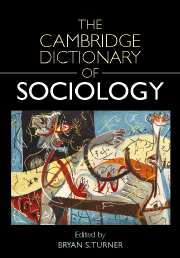H
Published online by Cambridge University Press: 22 October 2021
Summary
Habermas, Jürgen (1929– )
Often regarded as the most influential German social theorist of the second half of the twentieth century, Habermas belongs to the Frankfurt School, a group of neo-Marxist intellectuals who pursue a critical theory of society. Habermas belongs to the so-called second generation of the Frankfurt School; the first generation consists, for instance, of Theodor Wiesengrund Adorno and Max Horkheimer. He initially worked under Adorno's supervision, but soon developed his own version of critical theory.
Habermas's project differs from Adorno in a number of respects. First, whereas Adorno's critique was directed at the Enlightenment project, Habermas emphasized its positive features. He recognized the problematic nature of the current sociopolitical constellation, but he insisted that these problems were not intrinsic to modernity. He argued for recognition of the liberating features of the shift towards modernity, and the central nature of these features to any critical theory. Second, whereas Adorno's notion of rationality was still embedded in the “philosophy of consciousness,” Habermas sought to ground reason in the intersubjective context of daily linguistic usage. For this, he drew partly on the speech act theory of J. L. Austin (1911–60) and partly on the theory of psychological development of Lawrence Kohlberg (1927–87), who published Stages of Moral Development (1971).
The Structural Transformation of the Public Sphere (1962 [trans. 1988]) was Habermas's first book, and it already expressed his belief in the importance of unconstrained, open debate amongst equals. He called this the ideal of a “discursive will-formation.” Habermas argued that the emergence of bourgeois society made possible the potential for realizing this ideal. With the advent of bourgeois society, a public sphere emerged: people openly discussed political issues, which appeared in newspapers and magazines. Modern society has not fulfilled this potential, partly because of the way in which the content and role of the media have changed. Several commentators criticized Habermas for overestimating the existence of the public sphere in the nineteenth century. They pointed out that several sections of society were excluded: notably working-class people and women. Some feminist authors add that the emergence of a private sphere for women was constitutive of the public sphere for men.
- Type
- Chapter
- Information
- The Cambridge Dictionary of Sociology , pp. 258 - 276Publisher: Cambridge University PressPrint publication year: 2006
- 1
- Cited by



